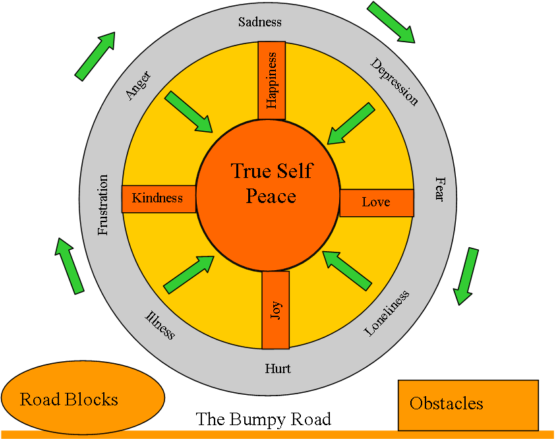
Best Resilience Project with How to Develop and Stop Relapse

“The block of granite which was an obstacle in the pathway of the weak becomes a stepping-stone in the pathway of the strong.”
Thomas Carlyle.
It is crucial to identify any limits or obstacles, when working through your depression, in order to eliminate them, or at least utilise them as a stepping stone.
A cognitive exploration of what factors are holding you back, slowing you down or preventing you from achieving your goals can be most enlightening. Almost all progress toward a goal or series of goals comes up against a limiting factor of some kind. Ask yourself, “What is my goal or series of goals?” then state, “I am going to do that now!” And notice the thoughts, or series of thoughts, that hold you back form fulfilling your heart’s desire right now.
Progress at the pace you’d like, and in the direction of your goals, requires the systematic identification and removal of obstacles that undermine advancement. Honest reflection and analysis are necessary to identify obstacles that hold you back from achieving your goals. Obstacles may be entrenched within organisational structures or culture, or they may be a blue-print handed down through generations, practiced, repeated and embedded in our own mind, reflecting out in the beliefs that you hold and the behaviours that you routinely perform.
By reflecting honestly on the obstacles within your own mind, you become better equipped to focus your energies on removing, eliminating or correcting the most appropriate obstacles. Personal obstacles consist of any belief, thought or action that may sabotage your progression towards your goals. As you do this reflecting and correcting you are more likely to see change as a function of your own doing, bringing comfort to change and consequently you will make smoother, more efficient progress, and build greater resilience, as you come to recognise the truth of who you really are and the abilities that you have.
These obstacles, or self-limiting thought blue-prints, can manifest in a multitude of ways and can impact on the way in which we appraise, interpret or analyse any given situation or event. Self-limiting thought forms may include:
• Black and white thinking
• Unrealistic expectations
• Selective thinking
• Imagining catastrophic outcomes
• Self doubt and criticism of self or other
This style of thinking can lead to a lack of assertiveness, vague time management and low self image.
Resiliency, then, is the ability to recognise and identify limited thinking, being able to pause it, reflecting on and identifying the truth, locking that truth into place through repetition and then acting from that focus. The key to resiliency in depression is self-awareness, becoming intimate with your self (in-to-me-see), and being constantly aware of your individual thought processes. As you replace these self limiting blue-prints with truthful, accurate, new truthful blue-prints, your resiliency will build to where you can sustain the greatest storm and move the greatest obstacles to your peace!
Resilience is a learned behaviour and can be learned and developed in anyone. (American Psychological Association). This level of in-to-me-see can be achieved, and is not limited to, the following support structures:
• Meditation, relaxation, and mindfulness.
• Being open and comfortable with experiencing strong emotion and developing self regulation skills.
• Cognitive Behaviour Therapy for mental restructuring, and the development of communication and problem solving skills.
• Community support groups and teams – being around strong positive thinkers.
• Developing strong relationships with caring and supportive family and community members.
• Joining spiritual study groups that point to the truth of who you are, in person and/or online.
• Self development courses, especially those that will accredit you to teach self development and thus continue to help you practice as you teach.
• A life long devotion of time to practicing intimate, resilient thought; (just like your body, if you don’t take your mind to the mind Gym, • Healthy diet and regular exercise, physical, mental and emotional.
• Keeping a journal where you enter at least one constructive thing that you have done or experienced each day, then reading this as a story.
Resilience is like being the ocean while you are watching the waves.
#counsellorron
